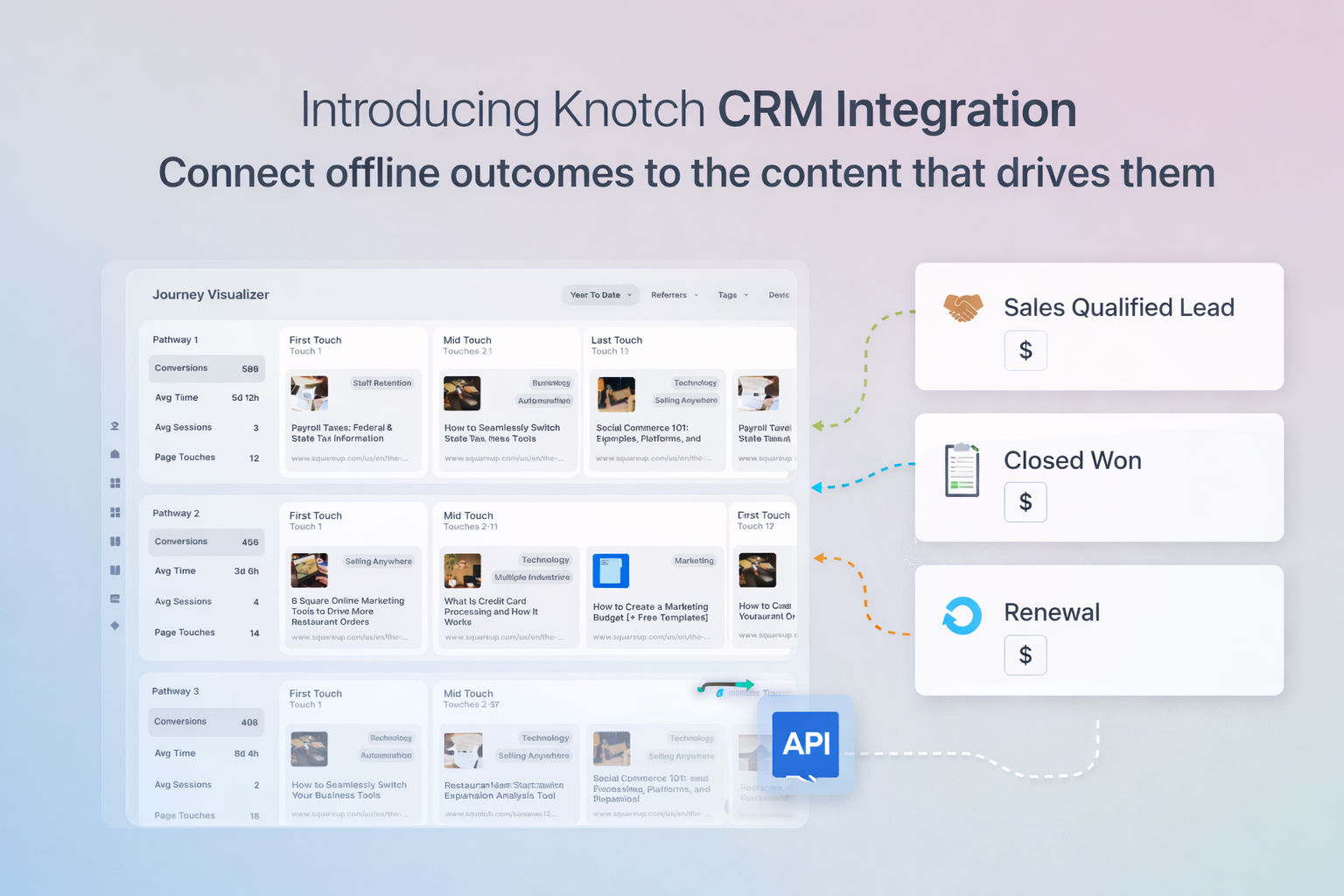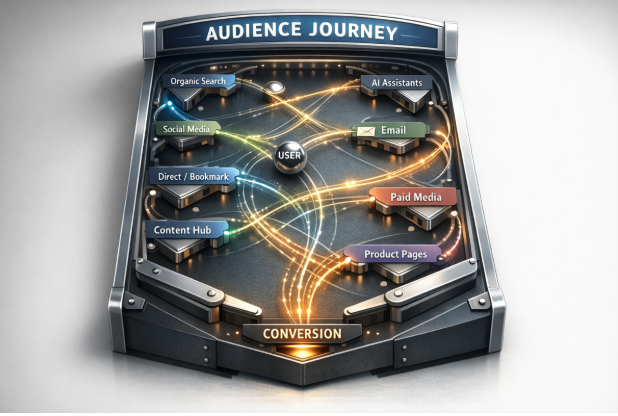
Why Gen AI Make Measurement Frameworks Essential for Content Marketing Success

What is your measurement framework? As a content marketer, if you’re having trouble answering this question, keep reading.
The job of content marketers is difficult enough. On any given day, they are focused on creating content, conducting market research to better understand their audiences, and most importantly, trying to justify the work that they’re doing.
This final point is usually a black hole for content marketers. And for some, performance is really only measured by page views, that’s merely an early step in the journey.
However, performance is far more than just visits to a page, and this is why data should be every content marketer’s best friend. As a content marketer, a well-constructed measurement framework will be their best ally.
Simply speaking, a measurement framework is a visual way to break down business outcomes and content marketing objectives into actionable targets and KPIs. Said in another way, a measurement framework shines a light on the value of content marketing efforts so that opportunities can be identified to increase business impact.
4 Reasons to Create a Measurement Framework
Over the past couple of years, content marketers have likely had to justify spend, fight for budget, and prove why the work that they are doing is helping support the business. However, content marketers shouldn’t have to constantly live in fear, uncertainty, and doubt about their position or contributions to the company.
Content marketers know that they drive value, but normally struggle to prove that value.
There are four reasons why a measurement framework will make content marketing efforts an invaluable asset to the marketing org.
1. Provides a Simple and Memorable Visual into Performance Measurement
A measurement framework is an easy way to visually map out all of the outcomes and objectives and then align them with KPIs. This will demonstrate to leadership how the performance of work being done can be tracked. See and download the Knotch measurement framework template here.
2. Identifies Blind Spots in Measurement
Measurement frameworks reveal gaps where it is not possible to track one or more outcomes’ objectives. This will act as a lightning rod to close the gap with measurement innovation, with new or redirected investments in data, technology, and research, so that marketing efforts can be fully tracked. Remember, if an objective cannot be measured, it’s not really an objective, and begs the question if it’s the right objective.
3. Validates Work and Allows Refinement of Skill Sets
At some point, content marketers will be asked to prove the results of their work. A measurement framework ensures that they can do this, because ambitious objectives and KPIs will create a skill stretch that will need to be addressed through learning and development, and maybe adding new resources. The mere presence of a measurement framework demonstrates to leadership that content has moved from being a cost center to a return on investment. Content marketers can then be thinking deeply about the performance of the business. That’s a good career move.
4. Targets Generative AI Precisely to Meet Objectives and KPIs
With the emergence of generative AI, it is crucial to target this technology precisely to meet specific objectives and KPIs rather than just achieving nice-to-have goals. A measurement framework helps in setting clear targets for AI initiatives, ensuring that they align with business outcomes and deliver measurable value. This precision in targeting AI efforts can significantly enhance the impact of content marketing strategies.
Content marketers are constantly fighting for and justifying budgets. Every investment demands an answer about what it is returning back to the business. It’s better to be an investment than an expense, especially in the current environment. A measurement framework is the ticket to ensuring there’s a path to report back on investments, and justify all the work that a content team is doing.
The answer to why a measurement framework is needed can ultimately be summed up in this one sentence:
A measurement framework is a way for content marketers to justify the value of their work, while making sure that they continually produce better results and drive a greater impact for the business.
Why Reporting Cadence for the Measurement Framework is Important
One of the most important aspects of a measurement framework is the reporting cadence.
The reporting cadence ensures nothing is being missed when reporting back on content and marketing performance. It should connect to decision-making timelines. If decisions are made on a daily basis, the measurement framework should make data available on a daily basis.
For example, tracking performance of content from email and social activities on a weekly basis will ensure there are no blind spots in strategies. It will also help tell a better story about what’s working and what’s not working. The goal of performance data should be to leverage information from prior weeks to inform future strategies.
Reporting cadence will also indicate revisions are required in the measurement framework.
As mentioned earlier, a measurement framework will help to identify blind spots. As time progresses, a content marketing team may add or change activities or initiatives. Content marketers may build a new content campaign that is using different channels or they have invested in new content software that is providing additional metrics. Because of this, constantly revisit the measurement framework to make sure that blind spots haven’t appeared as efforts have changed.
The recommendation from the pros at Knotch is to revisit the measurement framework at the end of every quarter to ensure that there are no gaps.
3 Reasons to Revise the Measurement Framework
Here are three reasons for continually revising the measurement framework:
1. Provides Guidance to Content Marketing Teams
The data arena is constantly changing and the way data is sourced may change. As content marketing activities change and evolve, adjustments may be necessary in how things are tracked.
And with the addition of new tools in the marketplace, new metrics may emerge that better align with business outcomes and objectives.
By revisiting the measurement framework on a regular basis, content marketers will be able to provide insights that support other parts of the marketing team, like customer journeys, audience engagement, brand perception, conversion rates, and retention rates. All of these will ultimately allow for painting a bigger picture of content and marketing environments.
Understanding the cause and effect of various metrics to achieve business outcomes will evolve over time. That’s when a metric becomes a key performance indicator.
2. Provides Visibility Into ROI
All content marketers ultimately report to someone and those people have expectations. Even more important, the people those people report to, have even higher expectations. This boils down to making sure a company is making the right investments. The measurement framework ensures the right investments are being made, and provides transparency for investors who will be able to better understand the business performance.
3. Adaptation to Market and Audience Dynamics
Market conditions are constantly changing. Competitive landscapes are also shifting at the same rate. As a result, content marketers may find themselves fighting for more budget or justifying marketing spend to ensure they can continue driving success. By regularly reviewing the measurement framework they can adapt strategies to changing market conditions and justify the spend around those activities.
Last but not least, audience needs, wants, and desires are not fixed. As consumer and business trends change, so should marketing strategies. Regularly reviewing the measurement framework helps to stay in tune with audiences’ evolving needs and preferences.
The development and deployment of a measurement framework may sound like more work on top of all of a content marketer’s to-do lists and other assignments. But it should be the core assignment.
Become a thought leader
Become a thought leader
Trusted by the largest (and now smartest) brands in the world.
“Before Knotch we did not understand what content was driving business results. Now we understand which content moves the needle. Knotch’s cohesive reporting and insights paint a real picture of what’s happening on our website instead of the patchwork quilt that comes from a Google Analytics approach. With Knotch we have been able to re-prioritize ad spend, route better leads to our SDR team, and inform our content development initiatives.”

"The Knotch platform ensures that we deliver high-performing content tailored to young home shoppers, enhancing their experience and driving better business outcomes.”

"Our partnership with Knotch has been highly successful, empowering us to leverage data-driven insights and refine our content strategy.”




.png)




